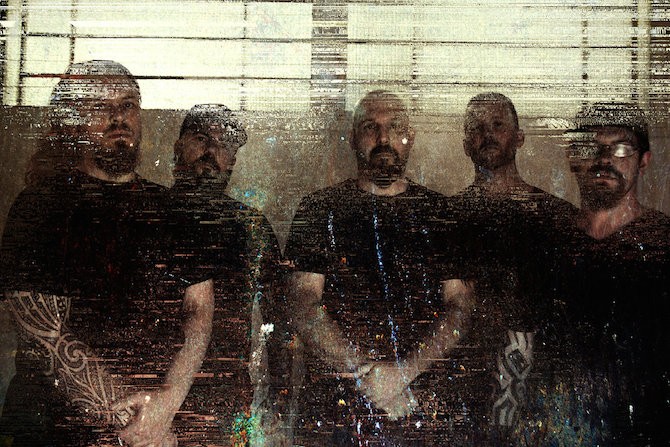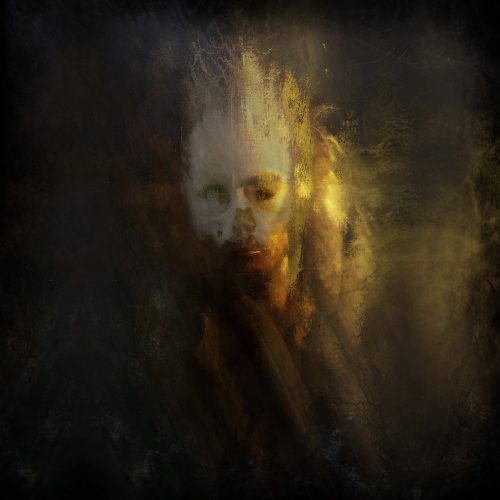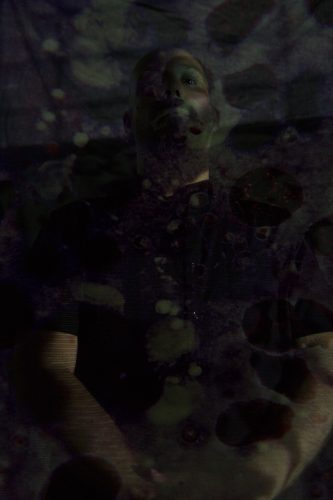(In this edition of Waxing Lyrical, Andy Synn elicited thoughts from Steve Tovey, vocalist of the UK metal band The King Is Blind.)
Raise your hand if you’ve heard of The King Is Blind?
Now keep them raised if you’ve heard their fantastic second album, We are the Parasite, We are the Cancer.
If your hand is down… well, what the heck have you been playing at? Not only did I give the album a glowing review, but I also hand-picked it as a close runner-up to Immolation in last year’s “Critical Top Ten”, describing it as:
“…one killer slab of Old-school influenced audio violence, with a Major in Riffology and a Minor in Metallic History, whose every track seems to exist solely to remind you why you fell in love with the more extreme side of Metal in the first place.”
So, with all that in mind, you can see why I decided to talk to the band’s frontman Steve Tovey about his influences (or lack thereof), his favourite vocalists, novels… and pretty much anything and everything else which feeds into his overall concept for each of the band’s records.
Beginnings…
From day one of my first (shitty Thrash) band a quarter of a century ago, and even before then, I wanted to write the lyrics. The style, depth, and reasons for doing so has changed over the years, but it’s always felt natural and has been about wanting to tell stories and paint pictures with words. I’m rubbish at art, and pretty useless at writing music, though I do get involved in the arrangements and evolution of our tracks, but I’ve always studied literature and writing – I did English at degree level — and I’ve been involved in using words one way or another; be that writing for sites, magazines, blogs, lyrics… whatever.
When Lee (Appleton – guitars) and I talked about pulling The King Is Blind together — we were initially just going to be an as-and-when studio project — we talked about everything needing to have a certain gravitas and depth to it to stand out – nothing could be throwaway. Since then, we regularly talk through themes of certain songs, and the concept(s) for our albums.
Lee’s good at pushing me to the next level and challenging where I’m at, as I’m quite vague and broad in the main when it comes to the concepts, and he really helps me find what I’m actually trying to say, as the detail, direction, and style of the lyrics naturally sits with me. In the main, the responsibility for the majority of the music and musical direction has sat with Lee, the lyrics are mine, and the concepts start with me but are shared and shaped together.
We have an odd way of starting things out… the music comes first – Lee will assemble an arrangement of riffs that is an embryonic song. Half the time, it’ll be presented with a title that I’ll interpret in my own way and take the lyrics where I think they should go. If it comes across untitled I’ll come up with a title I think fits, Either way, I don’t like using the song title as a chorus line, though I have done it as a way of mixing things up, and trying to keep things fresh (‘GodFrost’). Though most of our songs don’t repeat the song title, the title may be referred to in passing, and they reflect the theme or ideas in some way.
Part of it is that I don’t want to sing (shout) someone else’s lyrics – and I’ll be honest, the thought of having another person involved in the lyrics really doesn’t appeal to me, as I don’t know if I could feel someone else’s words the way I can visualise and deliver my own – and the other part of it is that I see my role in the band as, intrinsically, to tell the story and deliver the verbal vision and direction.
Inspirations…
I don’t go out of my way to check out or be influenced by other lyricists, and I genuinely don’t give much of a shit about other bands’ lyrics, to be honest – a lot of bands have shit, pointless, or naff lyrics, so by just accepting them as they are, I don’t get worked up about it. There are odd words or phrases that jar in other bands works, but, generally, I’m very unconcerned with what other bands say or do. Where I do have favourite lyricists, they tend to exist in a very different sphere to the one TKIB inhabit, and are those who are very real or personal.
I do have some inherent influences that are by now ingrained… Nick Holmes and Aaron Stainthorpe in terms of word selection and Gothic metaphor, and Dani Filth in terms of, in particular, storytelling, but beyond that, I don’t feel I’m overly influenced by others, nor do I want to be. There will be sections where I’ll pitch the delivery and choice of verbiage with someone else in mind (on the newest stuff there’s a Karl Willetts section in one of the tracks, and another where I have Tomas Lindberg in mind), but those are more vocal influences than lyrical ones. I like my own way of an allegorical story arc told either throughout an album or within an individual song, where, line by line, it is masked in metaphor or hidden in obscure obfuscation.
I have an interest in finding, and telling, a story, in deconstructing and reframing things, setting out and unveiling a vision, and have loved doing the first two albums as multi-layered concept albums. Doing a band has different levels of enjoyment and what you get out of it, and for me, the creation of the lyrics is something I take both pain and pleasure from, but particularly pleasure.
I regularly try different methods, to see if I can create something interesting. I’ve tried effectively ad-lib (‘Bloodlet Ascension’ on Our Father, which, a few hook lines aside, was made up on the spot over two separate occasions – the second being onstage at HammerFest), visual inspiration (a previous, unreleased track in an old band drew on thoughts and lines inspired by jotting down stream of conscious while watching the surreal classic Through A Glass Darkly), literal inspiration (a lot of Our Father was written with direct reference to Milton’s Paradise Lost, in particular Chris Naughton’s guest spot on ‘…Daemons’, and the Dune series is a go-to of mine for lines and motifs).
The concept of Our Father was written very differently to that of We Are The Parasite, We Are The Cancer. Our Father was consciously mapped out… track one would deal with parts A through B of the story and so on, and the feel and style would be x and y at certain points. I had a chart with key plot developments and where they’d land and how they needed to be delivered, which meant the lyrics couldn’t be written, in the main, until the album was complete and tracklisting agreed, which was restrictive, but rewardingly challenging. It was meticulous, and written with Paradise Lost as a constant reference point and was, in essence, a rebooting of an existing work.
For WATP, WATC we wanted to make a contemporary album in terms of concept, and I wanted to tell my own story, not be basing things on someone else’s. Although there are some Classical references, and a continuation of the story from Our Father, I needed fluidity in the story and lyrics so we could work on songs as they were written, and have more flexibility in the tracklisting. In line with bringing the story into the modern day, the language had to evolve. This concept was less structured (though still involved about 5 pages in my workbook of working through concepts and ideas), and more focused on commenting on a series of themes against a backdrop of a story, whereas album one was more about linear, albeit allegorical, storytelling.
Influences…
I have a specific delight in referencing other artists. Not always ones I like… (there’s a reference to Avatar – a band I detest, but as a way to get an earworm out of my head), but mainly in terms of respect. I like answering other people, or providing the answer to an unwitting call. I also have a few Martin Walkyier-isms… in the TKIB universe, the words sun and Son (as in, metaphorical Christ) always interchange, and I like to word play, though not to the extent of being overly naff about it. I don’t want to highlight all the Easter eggs, but most songs have at least one reference to another artist, song, or lyric.
There is a line in “Mourning Light” — “Whose charcoal tongue shall quench the Son” — which is a direct response to one of my favourite lines of lyrics from one of my favourite songs — “I’ve eaten the sun so my tongue has been burned of the taste” (“Down In A Hole”, Alice In Chains) — and on one of our new songs, as yet unreleased, the line “Our Gods Have Not Abandoned Us, We Left Them For Dead” is a response back to the huge recent Architects album title.
Changes…
Back in mine and Lee’s old band, the lyrics, though still telling a story within each song, were much more Gothic and romantic, often looking at the themes that were around in European metal and film at the time – like Coppola’s Dracula… True Love Never Dies, love beyond the grave kinda stuff. So, I’m no longer the Gothy teen at university reading Sheridan Le Fanu and Anne Rice.
As an old git, I’m much more pragmatic now and, though I’ll set a whole album as an allegorical battle for the control of the universe, it’s very, very real and horrible now, but still with a sprinkling of my natural optimism. Much less fantasy, much more about holding up a mirror to our collective failings, including being biting about my own.
Something old…
OK, let’s use “Shed Nightward Beauty” from Dancing Under Glass. It’s very typical of where I was back then… telling the story of a partnership, or love that goes beyond initial superficial lust into a lasting, meaningful romance, where the passing of one means the other dies of a broken heart at the same time.
Looking back for the first time in about twenty years, it’s very simplistic in the words used, very obvious poetic references, but, ah, you know… it was very mid-’90s Gothic metal, I guess! Just, like the band was, one that didn’t really explore the depths it should have.
Something new…
I’m going to use “Embers From A Dying Son” from last year’s We Are The Parasite, We Are The Cancer as comparison.
On one level, it allows an essential plot development in the overall concept of the higher-level story arc to unveil, while at the same time being a standalone song that decries mankind’s utter disregard for the resources of Earth, our inability to replenish, protect, and respect our environment, as well as set a challenge to “the listener” to do something about it. It’s a song that’s societally aware, hopefully pushes some buttons, and sets out my, and indeed our, liberal view.
It shines a light on one of man’s shortcomings, discusses the sin of gluttony and how it manifests in consumerism and GREED, aka The Rape and Ruin of Earth; the need for MORE; “our” journey as people through the gross, greedy nature of humanity. The unstinting, unrelenting drive to devour more and more, to be more and more selfish and to consume and gorge our fill, to suck all the resources (natural, or otherwise) into our own gluttonous possession with no thought for the effects on future generations, or on the ravages of the Earth and other people it inevitably creates; full-on disharmony, the clashing culture we’ve invented for ourselves, with no time to enjoy the beauty, the melody, each other, as the consuming gulp of capitalism surges ever on, devouring communities, progression and everything but its own ever-growing belly.
The difference between the two emphases, the difference in depth between where I was then as a person and where I am now, I think, a journey that is similarly borne out in the development of us as songwriters and where TKIB sits in comparison to what we were doing with other bands.
And finally…
The next step is to keep doing something different – to acknowledge where there is a formula and to try to challenge myself, do something diverse and hopefully find something interesting that works. It means I’m lyrically operating in an uncomfortable space for me on the third album that we’re working on, as, this time, it’s about stripping away the metaphor and being a lot more direct, focused, lean, and saying what I’m actually saying.
I’m not sure if I like it, being honest, and it’s a challenge to be direct without being cheesy, but it’s one that suits the story we’re going to tell on album three.
There are still some nods to the past, and some of my own personal tropes I’m not ready to shed yet – I’ll still be referencing other artists – and not every track will be in the same style. I’m not sure how that will continue to play out, ’cause I do miss the cherished mask of allegory and metaphor, but it does make things harder hitting.
https://thekingisblind.bandcamp.com/
https://thekingisblind.com/




This is a good column.